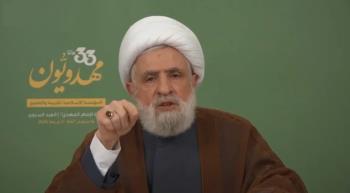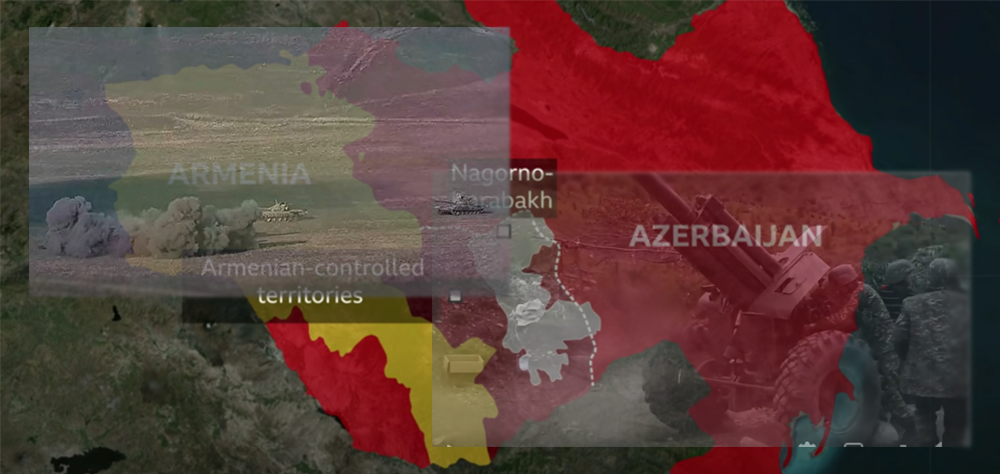Alwaght- As the war between Armenia and Azerbaijan has increased over the Nagorno-Karabakh issue, rumors and discussions about the transfer of terrorists in Syria to the disputed region have increased in recent days.
Since the early 1990s, Azerbaijan and Armenia have clashed over the control of the mountainous region of Nagorno-Karabakh. The latest armed clashes began in July, with both sides reporting casualties. The mostly Armenian-populated Nagorno-Karabakh region (literal meaning, mountainous black garden) in southeastern Azerbaijan came under the control of Armenian forces in 1994 and has since unilaterally declared independence as the Nagorno-Karabakh Republic (also known as the Republic of Artsakh). However, no country in the world, not even Armenia, recognizes this self-proclaimed republic, and the United Nations continues to recognize it as part of the territory of the Republic of Azerbaijan.
However, with the explicit support of Turkish forces for Azerbaijan and the continuation of the war until the recapture of the region by the Baku military, doubts have been raised that terrorists are being transferred from Syria to help the Azerbaijani army by Ankara.
Evidence and Reports by Media Regarding Turkey's Actions
This issue was first raised last Monday by the Armenian ambassador in Russia. He claimed that Turkey had sent about 4,000 fighters from northern Syria to Azerbaijan.
Subsequently, international media reporters started to investigate whether evidence regarding such claims exist. Reuters quoted two Syrian rebel sources have confirmed that Turkey was sending Syrian fighters to Nagorno-Karabakh to support Azerbaijan.
The Syrian Observatory for Human Rights claims that more than 300 Syrian fighters have been stationed in Azerbaijan, a longtime ally of Turkey.
The founder of the Syrian Observatory for Human Rights, Rami Abdul Rahman, told VOA on Tuesday that the Syrian fighters came from two armed groups known as "The Sultan Murad Division and The Suleyman Shah Brigade". The two Ankara-backed terrorist groups that are key players in Turkish-controlled areas in northern Syria.
Stressing that these elements of the Syrian armed groups had arrived in Turkey from the Afrin District northwest of Aleppo a few days ago, the Syrian Observatory for Human Rights reiterated that another group of militants were ready to be sent to Azerbaijan, given Turkey's insistence on turning its affiliated Syrian fighters into mercenaries for themselves. At least 18 militant group members were killed in Nagorno-Karabakh, the Syrian Observatory for Human Rights has claimed. It was also announced that a total number of 850 Syrian militants had been transferred for the purpose of war.
Agence France-Presse (AFP) also reported that a number of Turkish-backed Syrian militants had been killed in the Nagorno-Karabakh conflict, according to a report from Stepanakert, the capital of the self-proclaimed republic of Nagorno-Karabakh.
In addition, online media outlets in northern Syria have published images of Syrian militants killed in Nagorno-Karabakh. Armenia accuses Turkey of military intervention in Nagorno-Karabakh crisis. However, the Turks and the Azerbaijanis deny such a claim.
In other news, Ziad Hajj Obeid, a commander of the Turkish-backed Syrian National Army terrorist group, told Rudaw TV, a Kurdish television channel based in the Kurdistan Region of Iraq, that there are two reasons why Syrian rebels are being pushed to join the war in Azerbaijan. Obviously some went to Azerbaijan for financial encouragement, but others made the decision to go due to a sense of duty towards their Turkish allies, Obeid said.
Political Warnings of Foreign Officials to Turkey
However, as media reports on the issue spread and images of the transfer of these forces on social media are publicized, political officials of some of the countries interested in the Nagorno-Karabakh developments also commented on the possibility of Turkey's involvement in Karabakh conflict.
French President Emmanuel Macron, whose country's relations with Ankara have been strained in recent months over the Mediterranean issue, claimed in a briefing after the first day of the EU summit that the country's intelligence has found evidence of the transfer of 300 armed individuals from Syria to Azerbaijan. The Elysee Palace also issued a statement saying that they are cooperating with Russia to reach a ceasefire agreement between Azerbaijan and Armenia.
Earlier, the Russian Foreign Ministry claimed that fighters from illegal militant groups based in Syria and Libya had been sent by some countries to the Nagorno-Karabakh region in the past few days.
Accordingly, Moscow called on the countries involved to prevent the use of "terrorists and foreign mercenaries" in the Nagorno-Karabakh conflict.
On October 4, US Secretary of State Mike Pompeo warned Turkey about sending Syrian fighters to fight alongside Azerbaijani forces.
Turkey's move to send Syrian fighters to the Nagorno-Karabakh region will destabilize the region, Mike Pompeo emphasized.
These accusations and reports have been strongly denied by Azerbaijani and Turkish officials, who have claimed that such issues are raised by Armenia and other international parties supporting Yerevan. They claim that this is done in order to spread media propaganda, so that Armenia can benefit from it. In an interview with reporters, Azerbaijani President Ilham Aliyev said he considered the news to be fake and stated: There are no fighters from Syria in these battles, there is not even one document in this regard, this fake news is presented by Armenia and spread through various websites and media platforms, and they are all fake. Last week, AKP spokesman Omer Celic tweeted that the allegations were false and provocative against Turkey.
Nagorno-Karabakh on the Verge of Becoming Another Warzone Similar to Syria
Interestingly, Azerbaijani authorities mutually accuse Armenia of using foreign elements in the war. In this regard, the Office of the President of Azerbaijan announced that: At a press conference President Ilham Aliyev stressed that Yerevan is using forces transported from the Middle East in the Nagorno-Karabakh war. These armed forces consist of different races, including Armenians. We have credible information in this regard and this issue should be investigated on a wider international level, he claimed.
This reciprocal accusation comes at a time when various countries are beneficiaries and influential in the developments taking place in Nagorno-Karabakh, and the experience of using proxies in Syria, Libya and Yemen have caused major tragedies, resulting in regional instability and complicating the crises, and now there is a risk that the scope of the Nagorno-Karabakh crisis will increase with the presence of proxy wars taking place.



























